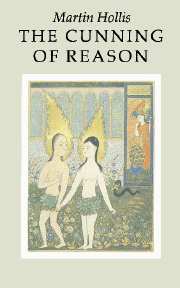Book contents
- Frontmatter
- Contents
- Preface
- 1 The sovereign artificer
- 2 Rational choice
- 3 Norms and institutions
- 4 The Cunning of Reason I: unintended consequences
- 5 Motivation
- 6 External and internal reasons
- 7 Rational Expectations
- 8 Maximising and satisficing
- 9 The Cunning of Reason II: functions and rules
- 10 Reasons and roles
- 11 Rationality and understanding
- 12 The Cunning of Reason III: self and society
- Bibliography
- Index
9 - The Cunning of Reason II: functions and rules
Published online by Cambridge University Press: 15 December 2009
- Frontmatter
- Contents
- Preface
- 1 The sovereign artificer
- 2 Rational choice
- 3 Norms and institutions
- 4 The Cunning of Reason I: unintended consequences
- 5 Motivation
- 6 External and internal reasons
- 7 Rational Expectations
- 8 Maximising and satisficing
- 9 The Cunning of Reason II: functions and rules
- 10 Reasons and roles
- 11 Rationality and understanding
- 12 The Cunning of Reason III: self and society
- Bibliography
- Index
Summary
The suggestion just made in the name of pluralism, in a sense implying incommensurability, is that the declared goals of organisations are suspect as a key to their behaviour. In so far as an organisation professes a single goal, or a unified, harmonious set of them, it will do no more than satisfice. It has to do enough of what it professes in order to remain viable. Its subgroups and individual members share that much of a common interest but, beyond this, they have separate aims. So one should not expect the interplay either of organisations or, for that matter, of individuals to produce a definite, particular outcome. Although overlap reduces the possible outcomes, it does not reduce them to one, even in the ideal-type theoretical case where all agents are rational and act on rational expectations. Radical pluralism implies radical indeterminacy.
This challenge to the explanatory hopes of social science can be met, so to speak, top down or bottom up. An individualistic account of organisations and of Organisation Man proceeds bottom up, with whatever success it can finally achieve by the end of the book. For the moment, however, let us work with social facts – features of social life which have meaning for the actors and are external to each of them – and see whether the indeterminacy left when one considers organisations singly disappears when one views them systematically together. External pressure on organisations as a group will translate as a pressure on each to organise itself internally so as to respond.
- Type
- Chapter
- Information
- The Cunning of Reason , pp. 130 - 145Publisher: Cambridge University PressPrint publication year: 1988



